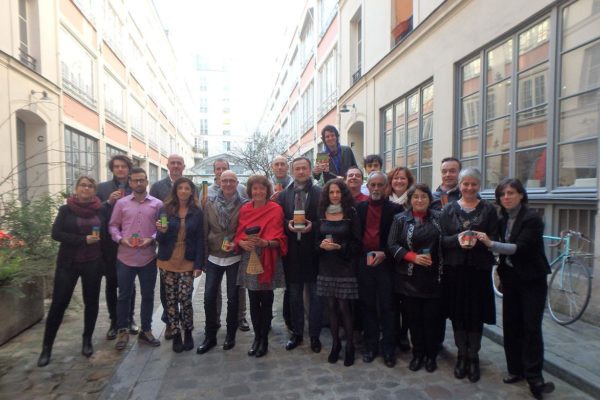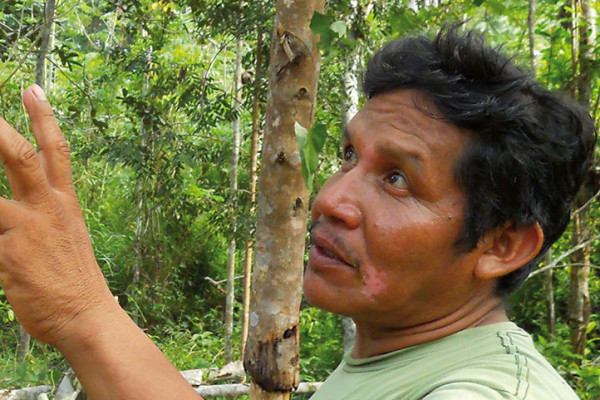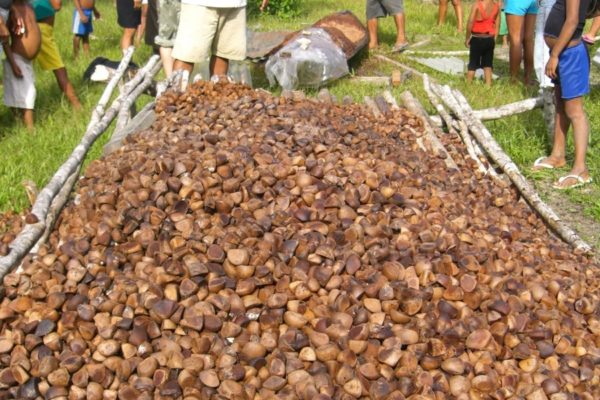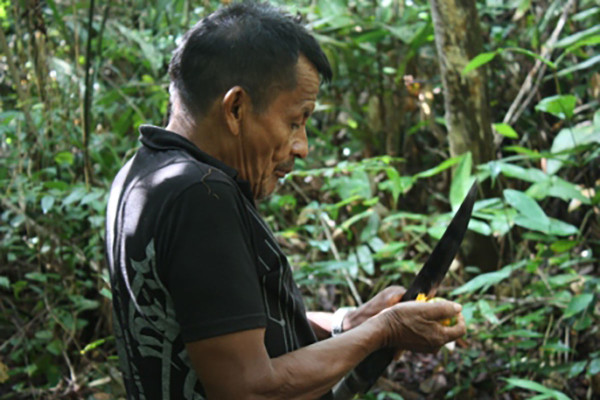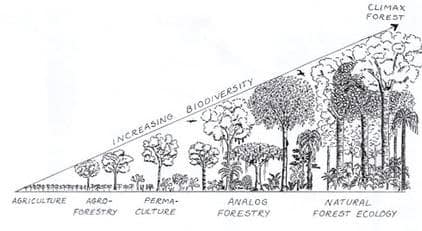A story of passion
Guayapi, source of noble and ethical raw materials since 1990.
Guayapi, founded by Claudie Ravel 30 years ago, is dedicated to the valorization of noble and traditional plants from their lands of origin (Amazonia and Sri Lanka, among others). Claudie Ravel has established a partnership that goes far beyond a simple commercial relationship with the Sateré Mawé Indigenous People of the Brazilian Amazon, by introducing their Warana, the Guarana of the Lands of Origin, to the European market in 1990.
On its own scale, it supports the Sateré Mawé tribe (15,000 Indigenous today when they were only 6,000 at the beginning of the project) in their daily struggle to preserve their identity, their culture and their territory. Through her travels, she sources the best materials proposed by indigenous peoples who do not have access to international markets, promoting traditional know-how that respects man and plant, banning all chemical transformation processes, while respecting fundamental criteria: organic, fair trade, and biodiversity.
The know-how of a sourcing expert
The selection criteria for the plants used in guayapi products are based on their original quality and purity.
These criteria are always based on a total absence of chemical preservatives and by obtaining a powder from the entirety of the chosen part of the plant, called the totum.
What is the totum?
The Totum (in Latin) is the part of the plant or fruit most concentrated in active ingredients, this can be the fruit, the flesh, the leaves, the root or the rind. In other words, the use of the synergy of the substances naturally contained in this part of the plant avoids any side effects.
This rigorous choice is determined by these 3 fundamental parameters :
- Respecting strict rules concerning the picking or cultivation and the location and quality of the soil.
- The harvesting period, which is decisive to have all the range of active ingredients.
- The drying process and how the plant is prepared for consumption.
Fair, sustainable and transparent supply chains
Since 2003, guayapi has been a member of the board of directors of fair trade france.
Since 2003, Guayapi is a member administrator of Fair Trade France.
From the Sateré Mawé Indigenous People of the Brazilian Amazon, to the Shipibos of Peru, to the Sri Lankan villagers of Halpola, Guayapi is committed to remunerating producers for the fruit of their labour, at a fair price including development projects in the producing communities, respecting biodiversity and ensuring that the consumer gets access to the exceptional quality of the product.
For more information: www.commercequitable.org
Preservation and/or restoration of ecosystems
Guayapi certifies our products by the FOREST GARDEN PRODUCTS label
Founded by dr. Ranil senanayake fgp certifies, in addition to organic, the preservation and/or restoration of original ecosystems according to the principles of analog forestry.
The Analog Forest is the name of a particular method of silviculture originally developed in Sri Lanka. An Analog Forest imitates the original forest and adopts a similar ecological structure and functions as the original forest. The objective of this method is to restore the productivity of their deteriorated land and thus provide new sustainable resources to local people.
In 2014, FGP has been integrated into the “Standards” of the International Federation of Organic Agricultural Movements (IFOAM). IFOAM recognizes it as the most “global” organic certification body.
The 7 fundamental principles of the ethical charter of FGP, respected by Guayapi:
- To restore the original ecosystems while respecting the local populations in their original habitat, in a healthy environment and thus preserve their culture and traditional know-how within the framework of fair trade.
- Promote the renewal of vegetation in deforested or degraded lands and increase the richness and biodiversity of the original plants and animals.
- To improve the yield of the land and reduce erosion by natural means.
- To transform intensive chemical production on farms into natural and organic production.
- Enhance the value of local products from local populations around the world with higher economic added value.
- Promote and develop knowledge on sustainable development and citizen consumption.
- Accompany producers to achieve these objectives together.
To find out more: www.analogforestry.org
Flavours of the land of origin: Good, Clean and Fair
Real allies in our daily well-being, the plants of the lands of origin sourced by guayapi are precious treasures for the catering industry and for our taste buds, so many flavors and culinary alliances are possible with these products.
Guayapi has always been anchored in the values of the Slow Food movement, for the promotion of “good, clean and fair” products. Guayapi is bringing together more and more great names in gastronomy, such as the renowned Michel Bras, who is using these precious plants to create taste combinations that are as surprising as they are delicious.

Pour en savoir plus : www.slowfood.com
Sentinelles :
L’arche du Goût :
The guarana, treasure of the indigenous people satere mawe
What is waran-guaranà of the homelands?
The Guaranà is a sarmonious liana of the Sapindaceae family. It was domesticated as a shrub several millennia ago by the Sateré Mawé Indigenous people. Its scientific name is Paullinia cupana Sorbilis.
THE DIFFERENCE BETWEEN WARANÀ AND GUARANÀ
The Sateré Mawé Indigenous call Guaranà, in their language, Waranà. It means the principle of knowledge. The Portuguese, not having the sound W in the alphabet, renamed the plant Guaranà. It is called so worldwide. However, the Sateré Mawé Indigenous today claim the difference of Waranà from Guaranà. Waranà thus benefits today from a Denomination of Origin (DO) in Brazil, the equivalent of our D.O.C. in France.
ACTIVE INGREDIENTS OF WARANÀ-GUARANÀ FROM THE LAND OF ORIGIN
Waranà is a powerful non-exciting physical and intellectual energizer. Waranà contains methylxanthines, energizing molecules such as guaranine. Guaranine is an isomeric molecule (similar but different) to caffeine. But Waranà also contains tannins, up to 10%. These tannins promote the slow assimilation of this active ingredient. This is why the Waranà of the Sateré Mawé or Guaranà Indigenous of the Lands of Origin (AOC in Brazil) does not produce any excitement effect. On the contrary, it provides a soft and powerful concentration. It remains stable and lasting over time. Waranà is therefore appreciated by students, athletes, workers, watchmen, artists and intellectuals.
THE ROLE OF GUAYAPI IN THE PROMOTION OF GUARANÀ IN EUROPE
Guaranà was no longer marketed in Europe since the end of the 19th century. Claudie Ravel, accompanied by her two scientific advisers Bernard Touati and Laerte Coaracy, spent 3 years between 1987 and 1990 putting together the scientific and legal files to be presented to the French and European authorities. This work enabled her to put Guaranà back on the market in 1990 as a food + or food supplement. Today, Guaranà is used in thousands of food and cosmetic products in France.
THE MEETING OF GUAYAPI AND CLAUDIE RAVEL WITH THE SATERÉ MAWÉ INDIGENOUS
In 1994 Claudie Ravel met Obadias Batista Garcia. This leader Sateré Mawé is the initiator of the Waranà Project. Guayapi quickly became the first commercial partner of the Sateré Mawé Indigenous People. Today, Guayapi is more than just a trading partner of the Sateré Mawé Indigenous. We support the Sateré Mawé Indigenous People by buying various forest products at high prices: Muirapuama (wood from the original lands), Copaiba Balm, Andiroba Oil, Amazon Nuts, Urucum, Técoma-Lapacho, Breu Branco, Rosewood…
PROJECT WARANÀ
The Waranà Project is the integrated ethno-development project of the Sateré Mawé people. Through Waranà fair trade, the Sateré Mawé Indigenous People are implementing social and environmental programs in their territory. These include: differentiated indigenous education, differentiated health, reconstitution of the original ecosystems in similar forestry… Guayapi thus pays the Waranà to the Consorcium des Producteurs Sateré Mawé (CPSM) 50€ / kg, i.e. 25 times the conventional market price in Brazil. Today, 337 families of Sateré Mawé producers are associated with the CPSM. This represents 2,000 people directly benefiting from the Waranà Project.


